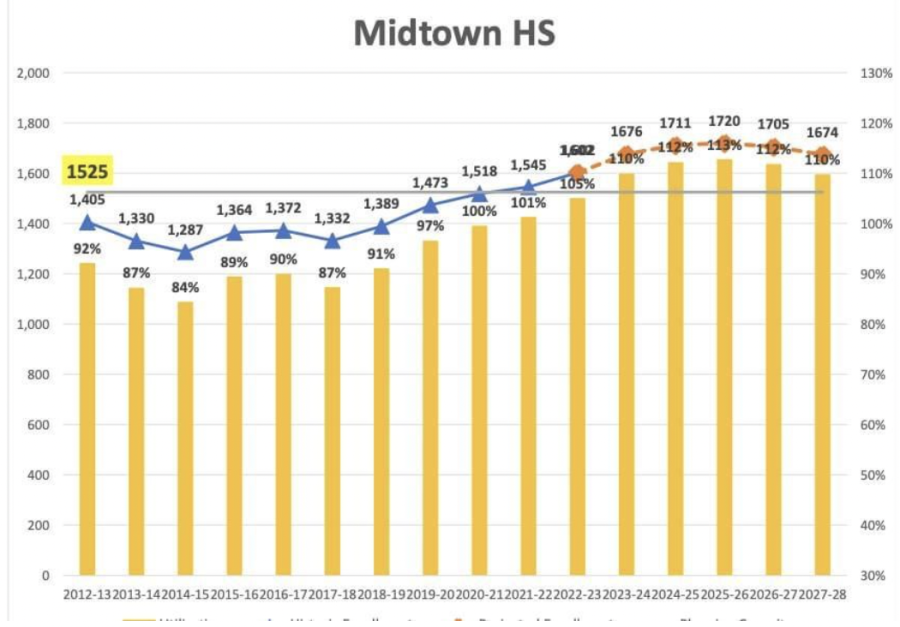More must be done to avoid overcapacity in district
Despite efforts to increase it’s capacity, Midtown is still well over its limit. This overcrowding is only expected to get worse in the future, and by 2025 Midtown is expected to reach 113% capacity.
March 10, 2023
Just last year, Midtown spent $30 million on an expansion that created room for 1,525 students. This project was funded with the intent of solving the school’s ongoing capacity issue, but by the time the ribbon was cut, Midtown was already overfilled.
According to Atlanta Public Schools, Midtown’s enrollment has continued to rise steadily since 2017. From 1,332 students just six years ago, enrollment has risen over 20% to 1,602 students in 2022. By the beginning of the 2023-2024 school year, the number of students enrolled is predicted to be just shy of 1,700.
Midtown’s situation might appear to be indicative of a larger overcrowding problem, but this is not the case. In fact, Midtown and Maynard Jackson are the only two schools in APS with major capacity challenges. These two schools are part of a capacity disparity in APS: the district has the capacity to accommodate more students, but that free space is unevenly distributed across schools. While Maynard Jackson’s issue is relatively new, Midtown’s problem has been constant throughout the past decade and continues to persist. In light of these challenges, APS has continued to allocate funds to the Midtown Cluster to increase capacity, and in 2016, gave the cluster $100 million to support school expansions and renovations.
Three major initiatives began with the funding the Midtown Cluster received. Two of these, Midtown’s campus expansion and the opening of David T. Howard Middle School were aimed at improving capacity. These additions cost approximately $30 million and $50 million respectively, and while the addition of Howard to the cluster has improved capacity issues in elementary and middle schools, it does nothing to aid problems at the high school level. As a result, new construction projects have done little to ease the burden on Midtown.
Although overcrowding might not seem like an issue at Midtown today, rising enrollment becomes a slippery slope when it isn’t adequately addressed. As more and more students pack into the building, Midtown’s already precarious parking situation will only continue to deteriorate. Students who arrive too late to find spaces in the lots will need to find parking spots elsewhere, clogging neighborhood streets and risking a late arrival.
Additionally, more students in the building places a cap on the number of staff who can be hired. Currently there are more than 145 faculty members at Midtown, and Midtown is able to hire new staff in order to best fit the needs of the student body. As more building space is required to fit new students, the school will run out of room for extra support staff, such as guidance counselors and college advisors.
One solution that has been proposed multiple times in recent years is the redistricting of the Centennial Academy attendance area from Midtown to the Washington High School. This change would affect approximately 229 students and would change APS zoning so that instead of going to Midtown, affected students would be sent to Washington. However, this proposal has faced severe backlash since it was first pitched. Parents of the students that would be affected by the change are understandably unhappy with having their children move from one of the highest performing high schools in APS to one of the lowest.
APS has no control over what areas of Atlanta experience growth, and can truly do nothing but react to new demand as it arises. Moreover, it is difficult for APS to take preventative measures, such as rezoning, without any backlash from the community. Such decisive solutions have been avoided in favor of those without any perceived losers.
While there will never be a single solution that can solve such a complex issue, something more must be done. Not only do temporary solutions such as the Midtown expansion cost lots of money, but they do nothing to solve the problem in the long run. Nobody wants to make hard decisions, but for the good of the Midtown community, APS needs to step up.







